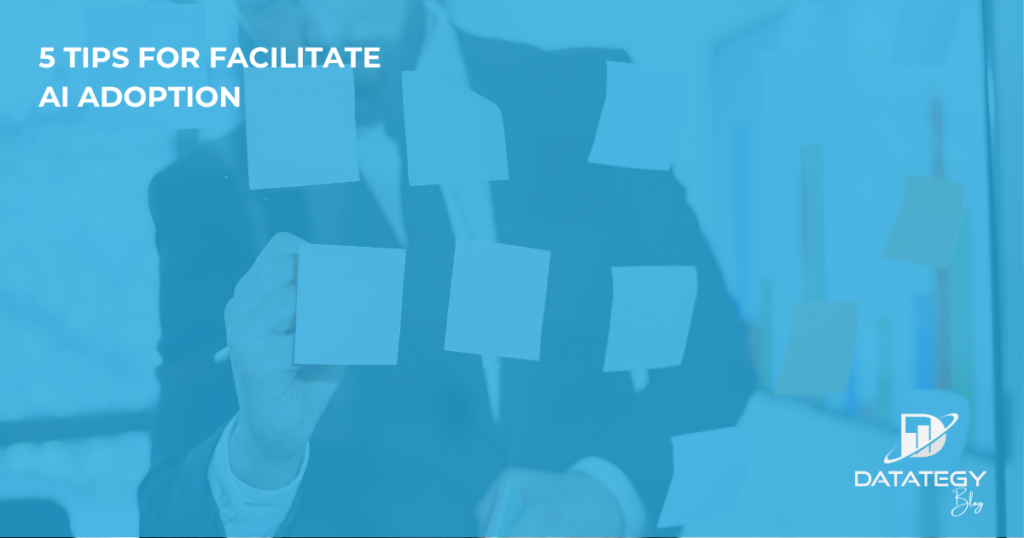Why AIOps Is Key to Cyber Threat Detection in Defense?...
Read More5 tips for facilitate AI adoption
Table of Contents
ToggleNowadays, artificial intelligence arouses the interest of many companies who perceive it as a competitive business advantage. While many companies already have AI topics in mind, still too few have actually implemented them for a number of reasons. 4 out of 10 French IT professionals (42%) say that introducing AI into their business is the most difficult task.
Artificial intelligence represents a real business challenge. Therefore, it is important to adopt the right practices to ensure the success of your AI strategy.

Read in this article the 5 key elements to facilitate AI adoption in your organization.
#1 - Define an AI strategy and clear objectives
Before embarking on AI adoption, it is essential to formalize a concrete use case based on clear and precise objectives to be achieved.
The use case and the objectives are defined in collaboration with the business and technical teams. Scheduling a workshop is a way to understand the business experts needs and to evaluate the technical feasibility of the project.
Asking the right questions during this exchange is important to understand what the business experts want to predict and why. This allows you to define the perimeters of the project to implement your AI strategy.
#2 - Identify and assess the quality of available data
The implementation of an AI project also requires the reflection of the available data.
A phase of exploration and centralization of data is necessary, in order to examine what is possible to take advantage of it.
If the amount of data is not voluminous enough, the algorithm can always be supplied with external data. Some AI providers offer to enrich your data, through open sources or own data.
The importance of data quality is not a factor to be overlooked. If the data is inaccurate or incomplete, the company will not be able to take full advantage of the capabilities of AI. The results obtained from the algorithm will not be accurate, or even incorrect.
Establishing data governance is also a requirement to ensure data quality. Thus, a data processing automation tool is an asset for the implementation of a data project. It enables the entire workflow processing chain to be handled, i.e. from data collection to data visualization.
#3 - Form a multidisciplinary project team or engage a center of excellence
In the context of an AI project, a team of experts is needed to collect, clean and model the data. The implementation of a multidisciplinary team is required, so that each profession brings its own expertise.
If the company does not have the human resources to form a project team, it is possible to engage AI providers that include a Center of Excellence offering.
The Center of Excellence provides data science experts in a very short time frame to quickly complete use cases and achieve a rapid return on investment. Because Datategy’s papAI platform is so simple and easy to use for accurate results, only a few experts are needed to handle multiple projects.
#4 - Choose the best tools
AI adoption within one’s company is often considered to be costly and not very profitable. Many data projects do not see the light of day because of this level of investment. Therefore, choosing the right AI platform is a key issue in terms of return on investment.
One of the criteria to consider when choosing a platform is its ethical aspect. An ethical AI solution capable of interpreting the results will help raising uncertainties about the presence of biases. The hyper-interpretability and hyper-explicability functionalities challenge the models and compare the results. It also allows to be informed about the impact of the decision taken and the possible actions to modify it.
In our last article, we give you 5 other criteria to take into account when choosing your AI platform. (lien article traduit)
#5 - Build a roadmap for AI
The AI roadmap is essential to ensure the success of the project. It allows to define the priority axes for the company to the adoption of AI. It also avoids surprises regarding the project’s progress and provides a global view to your teams with precise timelines on the project.
The roadmap of a data project allows the company to make an assessment of the constraints and resources required in terms of data, human resources and tools, in order to plan the implementation period and the investments.
Interested in discovering papAI?
Our commercial team is at your disposal for any question
Recommended Articles
How AI Transforms Predictive Maintenance in Defense Equipment
How AI Transforms Predictive Maintenance in Defense Equipment In a...
Read MoreHow to Scale AI Without Breaking Your Infrastructure in 2025
How to Scale AI Without Breaking Your Infrastructure in 2025...
Read More

